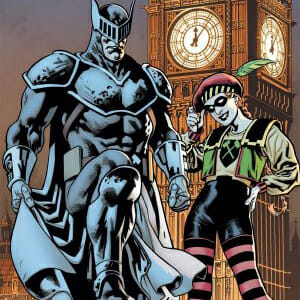Comic Book & Graphic Novel Round-Up (6/29/11)

Each week, Paste reviews the most intriguing comic books, graphic novels, graphic memoirs and other illustrated books.

Knight and Squire by Paul Cornell and Jimmy Broxton
DC Comics, 2011
Rating: 7.5
Oh, Britain: You’re so much like us, but so thoroughly, inconceivably different at the same time. Paul Cornell is British, of course, and that perspective made the short-lived Marvel series Captain Britain and MI:13 stand out among the racks of standard superhero fare. In Batman: Knight and Squire Cornell and artist Jimmy Broxton use the Grant Morrison-created British Batman and Robin analogues as our tour-guides to the UK of the DC Universe, where ages-old rivalries are put on hold at the local pub, and Jarvis Poker, the British Joker, puts a polite and panto-themed veneer of civility on the American original’s nihilism. Each installment of this six issue miniseries (now collected in a trade paperback) introduces a variety of superheroes and villains that riff on British culture. The references are often obscure to non-Britons, but that unfamiliarity nicely echoes that sense of exploration one feels when digging through the expansive and confusing history of DC itself. It’s like picking up a copy of some Silver Age comic you’ve never heard of and discovering a weird footnote of comics history. Knight and Squire isn’t just a fun superhero yarn; it’s a brief glimpse into a shadow comics industry that never existed. (GM)
-

-

-

-

-

-

-

-

-

-

-

-

-

-

-

-

-

-

-

-

-

-

-

-

-

-

-

-

-

-

-

-

-

-

-

-

-

-

-

-











































